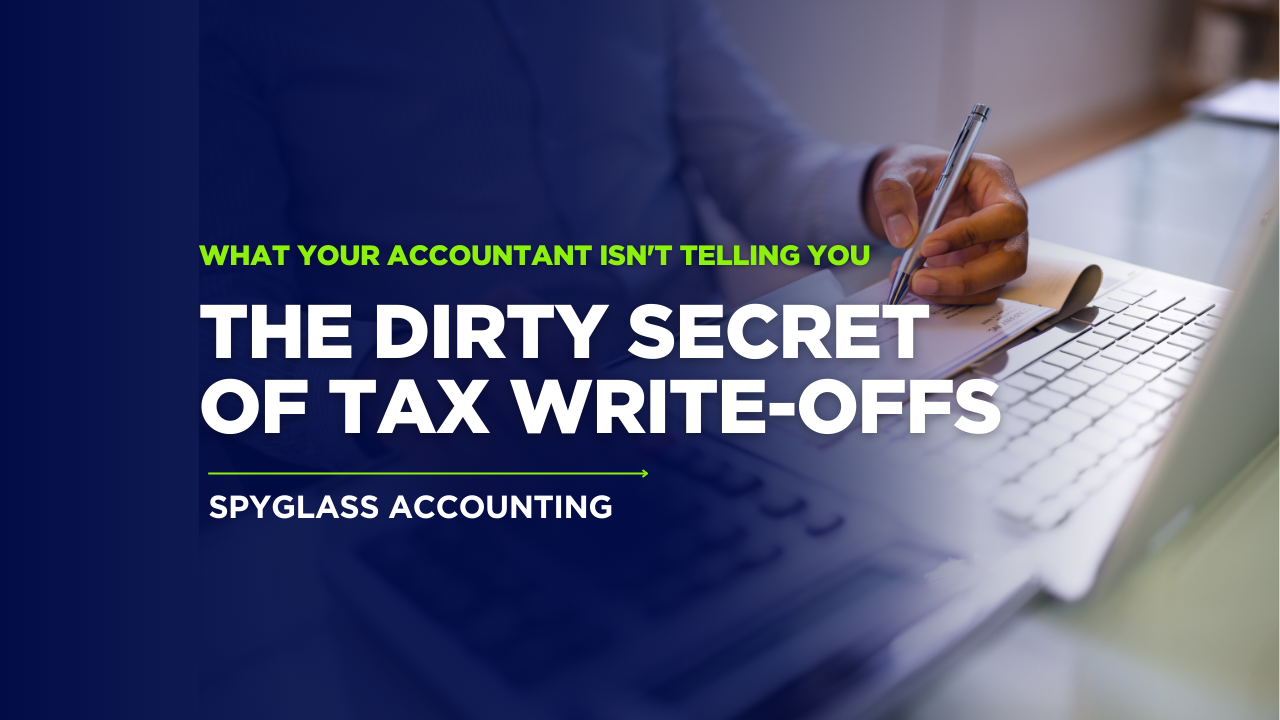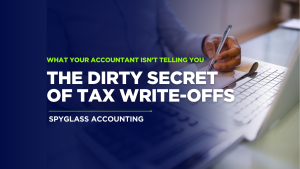
The Dirty Secret of Tax Write-Offs: What Your Accountant Isn’t Telling You
Tax Write-Offs Can Be a Lifeline—Or a Landmine
Every small business owner loves tax write-offs—but what if your deductions are actually setting off IRS alarms?
According to the IRS, over $30 billion in business tax write-offs were disallowed last year due to improper filing and missing documentation. That’s not just a stat—it’s a red flag for entrepreneurs who don’t know the difference between a legitimate deduction and audit bait.
At Spyglass Accounting, we help small business owners maximize legal tax write-offs while protecting them from costly mistakes, penalties, and IRS scrutiny.
Let’s uncover what most accountants won’t tell you about tax write-offs—and how you can avoid becoming another IRS target.

❌ 5 Common Tax Write-Off Mistakes That Could Trigger an Audit
1. The Home Office Write-Off Trap
What You Think:
“I work from my couch sometimes—that counts, right?”
What the IRS Requires:
- A dedicated workspace used regularly and exclusively for business.
- Simplified method: $5 per square foot, up to 300 sq ft.
- Actual expenses method: Includes depreciation—but carries higher audit risk.
Audit Trigger: Claiming 100% of your rent or mortgage without proof of a dedicated office space.
2. Misusing Meals & Entertainment Deductions
Outdated Info: Pre-2018 rules no longer apply.
2024 Rules:
- Client meals: 50% deductible (must discuss business).
- Employee meals: 100% deductible for workplace needs (e.g., overtime).
Audit Red Flag: Writing off luxury meals with no attendee names or business purpose listed.
3. The Hobby vs. Business Tax Write-Off Mistake
IRS Rule: You must show intent to make a profit—usually by being profitable 3 out of 5 years.
Examples of Misuse:
- A photographer writing off $20,000 in gear but earning $300/year.
- Calling vacations “industry research” and deducting airfare.
Fix It: Register your business, open separate bank accounts, and keep accurate records.
4. Vehicle Deductions Gone Wrong
Two Options:
- Standard mileage rate (67 cents/mile for 2024).
- Actual vehicle expenses (fuel, repairs, insurance, etc.).
Common Error: Claiming 100% business use for a car also used personally.
Pro Tip: Use tools like MileIQ to auto-track business mileage.
5. The “Family Employee” Grey Area
Allowed:
Pay your child up to $13,850/year tax-free—if they actually do legitimate work.
Audit Risk:
- Claiming payroll for a 5-year-old “content creator.”
- No documented job description, hours, or payment record.
✅ 3 Powerful Tax Write-Offs You’re Probably Missing
1. Retirement Contributions
- Solo 401(k): Deduct up to $69,000 (2024 limit).
- SEP IRA: 25% of net earnings.
2. Business Software Subscriptions
Yes, even Netflix—if used for competitive or marketing research.
3. Ongoing Education
Courses that maintain or improve current job skills are fully deductible.
👀 How the IRS Detects Questionable Tax Write-Offs
IRS DIF Score (Discriminant Function System):
An AI-driven algorithm that flags:
- Deductions disproportionate to income.
- Too many round numbers (e.g., $5,000 instead of $4,872).
- Write-offs that don’t match industry norms (e.g., 80% food cost for bakeries when 30% is average).
What an Audit Letter Looks Like:
“We’ve disallowed your $12,000 home office deduction. Please submit:
- Workspace photos
- 12 months of bills
- Client meeting logs”
Missing paperwork? Expect denied deductions + a 20% penalty.

🛡️ How to Use Tax Write-Offs Like a Pro (Without Getting Audited)
1. The Three-Legged Stool Method
For every expense, keep:
- ✅ Receipt or invoice
- ✅ Business purpose (e.g., “Strategy lunch with client X”)
- ✅ Proof of payment (bank or credit card record)
2. Leverage Accounting Tools
-
QuickBooks, Dext, and Xero auto-categorize expenses and highlight red flags.
3. Get a Pre-Audit Review
At Spyglass, we provide an Audit Risk Scorecard that includes:
- High-risk deductions
- Missing documents
- Industry comparison benchmarks
😬 Think You’ve Made a Mistake? Do This Immediately
- File an amended return (Form 1040-X) if within 3 years.
- Set up an IRS payment plan if you owe money.
- Respond to all IRS letters—most audits are resolved by mail.
🎯 Don’t Let Tax Write-Offs Backfire—Get Pro Help
Tax write-offs should save you money, not cost you penalties or sleep.
At Spyglass Accounting, we specialize in:
- ✅ Audit-Proof Bookkeeping – Every deduction documented and verified.
- ✅ IRS Penalty Shield – We cover penalties if we make an error.
- ✅ Year-Round Tax Planning – So you’re always ready for tax season.
The Small Business Owner’s Tax Write-Off Checklist – Learn what to claim, what to avoid, and how to document everything.
🔑 Key Takeaways
- Not all business expenses are deductible—know what counts.
- Documentation is king—no receipt = no deduction.
- The IRS uses algorithms—don’t stand out for the wrong reasons.
- Use software and expert reviews to stay safe and smart.
🚀 Ready to claim every dollar legally and confidently?
📞 Talk to Spyglass Accounting Today.